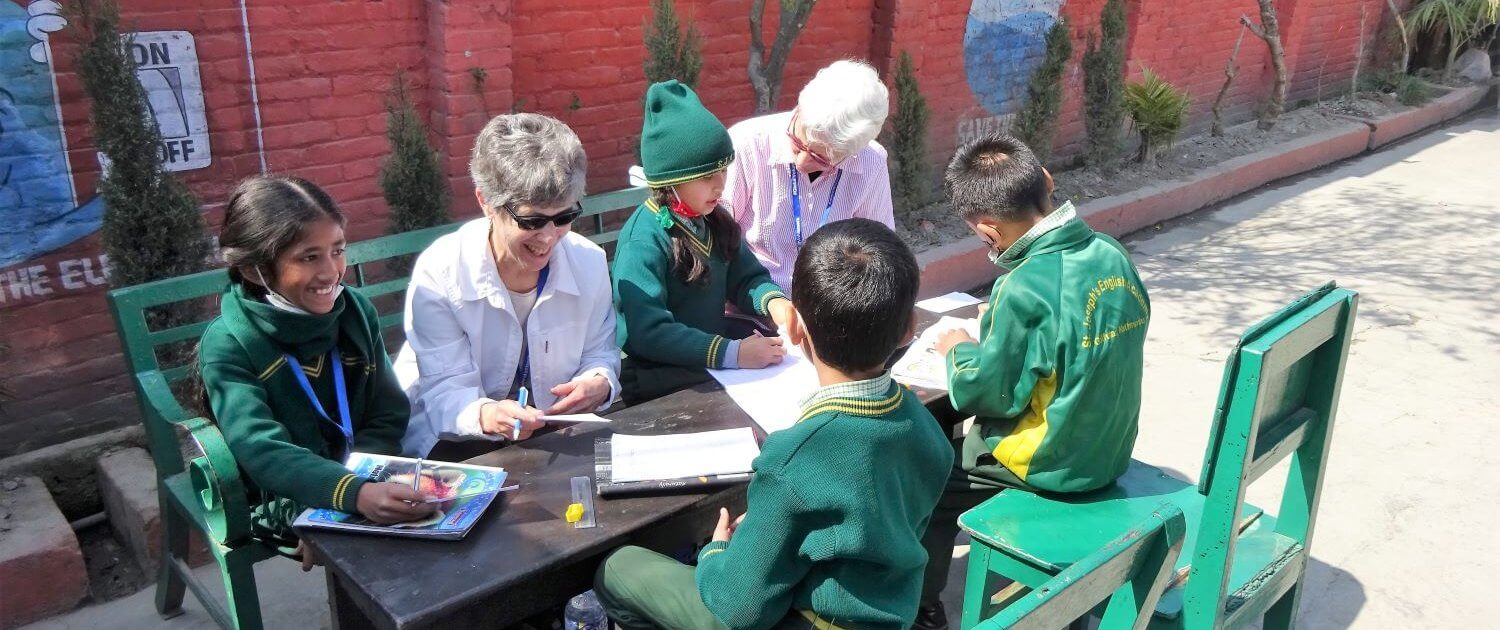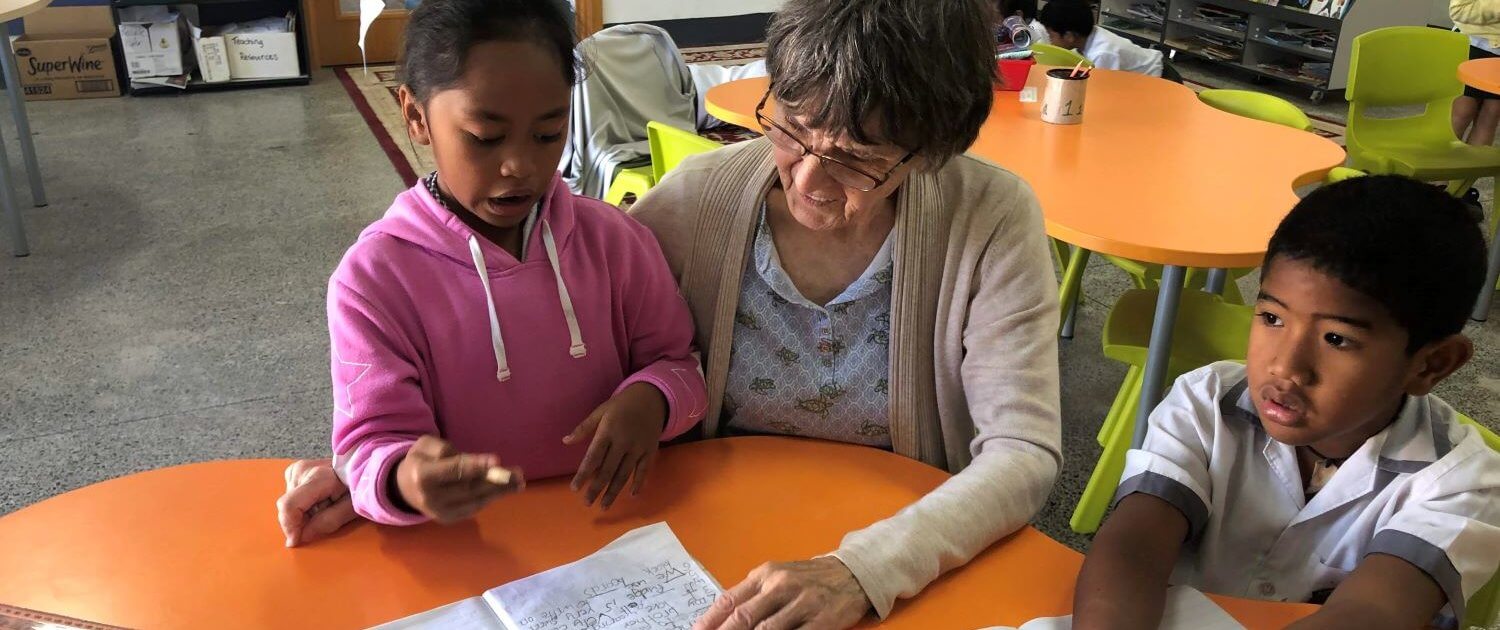Youth and Adults Learn English Language Skills from Generous Volunteers
It’s easy to underestimate the importance of English to the 95 percent of the world population who aren’t native speakers. But the volunteers who teach English to children and young adults in classrooms, small groups and language camps directly experience the difference in the lives of those seeking avenues for a better life. Read on to learn more – and how you can help!
As the international language of medicine and news, English was recognized during the global pandemic as a critical resource. And those who aspire to enter business, broadcasting, healthcare, technology or almost any other career know that English fluency improves their future life choices. Volunteers know helping students learn English enables them to open doors – to higher education, better jobs, and a clearer understanding of their place in the world. Through Global Volunteers service programs, youth and adults learn English in affirming and supportive skills training, based on the students’ individual capabilities and learning goals.

Global Volunteers has engaged short-term volunteers in conversational English teaching in most of our partner communities since 1990. Youth and adults learn English in diverse settings including preschools, elementary, junior and senior high schools, universities, businesses, government agencies, and language camps. Volunteers teach English with local teachers or team-teach with other volunteers.
Teaching in Latin America, Europe, Asia and Africa
In Cuba, Peru, and China, volunteers teach English to children who may have little to no English knowledge. In St. Lucia, Tanzania, and the Cook Islands, volunteers can tutor children in numeracy and literacy as they advance their English proficiency. In Greece and Poland, youth and adults learn English in classroom settings as well as at “English camps.” In Ecuador, volunteers teach English to preschool teachers. Though the settings are different, the need is there for the children to start learning their first English words or being able to complete their school assignments in English.

In every service program in communities where English is not the first language, our volunteers are part of an ongoing process that inspires children to study. Even though short-term volunteers teach English only for one, two, or three weeks, Global Volunteers strives to provide a constant flow of volunteers to ensure continuity and a long-term learning opportunity for youth and adults to learn English. In this way, each volunteer becomes an important link in a long chain of volunteers. So, everyone impacts the arc of a student’s learning in a relatively short time. You may not be the one who enables a student to begin speaking in complete sentences, but you encourage the student to continue learning so the next volunteer can lead them to a milestone.
“As a Global Volunteers ‘veteran,’ I was eager to join the Cuba Program right after the first of the year. The highlights were the conversations with the young English teachers who strolled the streets with us, and we shared our thoughts on similarities and differences in our cultures. They’re curious about the changes that Cuba might face when the U.S. Embargo is lifted. One woman, who is a lawyer, spoke to us of Cuba’s laws, and possible upcoming changes.“
Betty Wood, alumni volunteer
In most partner communities, the local English teachers are excellent grammarians. However, they often struggle with speaking the language, especially pronunciation, idioms, syntax, etc. The principal role of our volunteers teaching conversational English is to provide students the opportunity to hear a native speaker and to speak English in an environment where they are not evaluated.
Melinda Staveley, a multi-program volunteer who served in Vietnam, explained: “To be honest, I expected that students would be more fluent in English than I actually found. So my teaching assignments were quite useful. Expanding vocabulary beyond simple words and working on pronunciation were particularly helpful. Some of the people we are working with are using their phones to communicate with their clients, so we work a lot on pronunciation, enunciation, and clarity.”

Everyone Can be a Conversational English Teacher
Since volunteers teach English as a Foreign Language (EFL), as opposed to English as a Second Language (ESL), even those who have never formally taught in a classroom can make a difference. Team members receive an English Teaching Guide with teaching techniques and universal lessons for host countries, and prepare at least one hour for every teaching hour. Generally, activities are planned and prepared ahead of the class time, as the students can vary from day to day. Based on the age group and proficiency levels, volunteers are guided to activities that engage students. Youth and adults learn English through interactive songs, skits, and games in both structured classes and informal lessons with activities to reinforce learned concepts.
For instance, Poland Volunteer James May landed on an especially effective teaching method for students age 10 to 12. “To start off the day, the class did a birthday line-up from early birthdays to birthdays late in the year. That acquainted me with the students, and they had to think about numbers and dates. We moved to an assignment about experiences, such as “Find someone who has visited another country” and other questions. Students went around the room and asked other students to find people who did 20 different activities.” Jim ended the class time with Jingo, a game like Bingo with words or phrases in place of of numbers.

Youth and Adults Learn English at all Levels
Global Volunteers’ team leaders provide clear guidance to accommodate the culture, setting, age group, and English proficiency of students in each partner community. Each setting presents different opportunities and joys. While adult students who know the value of English in professional settings may be focused and serious, youth are always fun-loving, and can usually pick up English more easily. Most schools stress the importance of learning English in early grades. Volunteers report that the impact of teaching English to children – when their minds are fresh and ready for learning – can last a lifetime.
You may also like:




Leave a Reply
Want to join the discussion?Feel free to contribute!